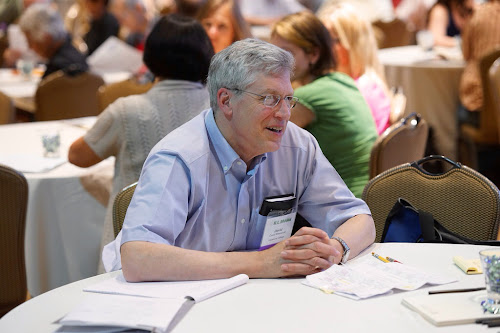The 2013 RLM/IBL Conference was a resounding success. My initial impression is that it was the best ever. Attendees chose their own path through the sessions, and interacted with on another the entire time.
Kudos to Jackie Jensen-Vallin and Angie Hodge as program committee co-chairs. Also hats off to Norma Flores, Albert Lewis and the EAF staff for organizing the logistics at the AT&T center at the University of Texas. Harry Lucas, Jr. also deserves special praise for his steadfast support for education reform.
 |
| Jackie Jensen-Vallin |
The theme of the conference was "We Are IBL." This theme was represented in the structure of the conference with the many breakout sessions, round table discussions, 5-minute report, and long breaks. Plenty of opportunities for attendees to share ideas and immerse themselves in discussions.
 |
| David Bressoud in discussion with fellow attendees |
David Pengelley, New Mexico State University, gave the last plenary talk of the conference on Saturday. He talked about how we can avoid the textbook trap and gave examples of how we might achieve this in our classes. One amazing idea he has developed is to use original sources, when possible, to drive the inquiry and explorations that students do.
 |
| David Pengelley |
Another point Pengelley made was to give students some responsibility to actually read and process information before class. The idea is to create an appropriate reading assignment with some tasks or guiding questions, thereby creating time in class to do more meaningful tasks. Students are not expected to learn everything or even a significant amount on their own. the core notion is getting first contact with a topic and start the work.
One way to look at this idea is another (earlier) version of a flipped class, except using a book or articles instead of a video. That is, using books the way they were meant to be used! The key is to collect something from students. Merely asking students to read isn't a good idea. Good coaching directs students towards clearly stated tasks, within student reach, in ways that encourage some authentic engagement.
Yet Another key point made by Pengelley is the notion that standard textbooks make the pathway too smooth and overly processed for learning. The idea is that if you're in section 7.2, then you'll use 7.2 methods on the problems. Hence students can get by with less than full engagement in the learning process. When it's all laid out for you, there's no mystery or puzzle left to solve.